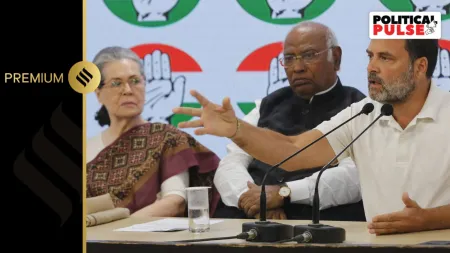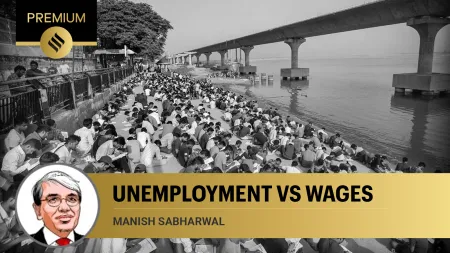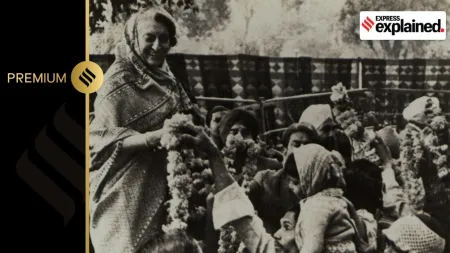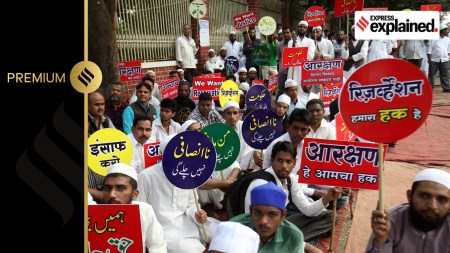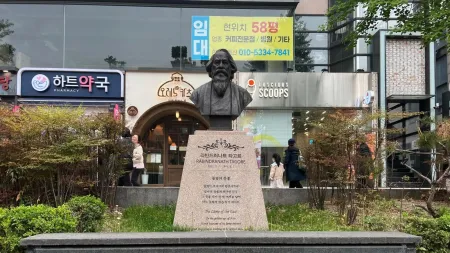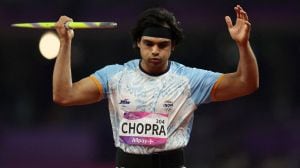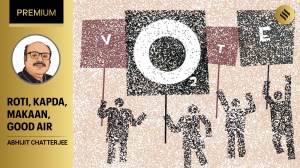- India
- International
Yes, bring on Bharatiyata
A deep exposure to Indian culture might cure its custodians of prudishness, machismo, homophobia
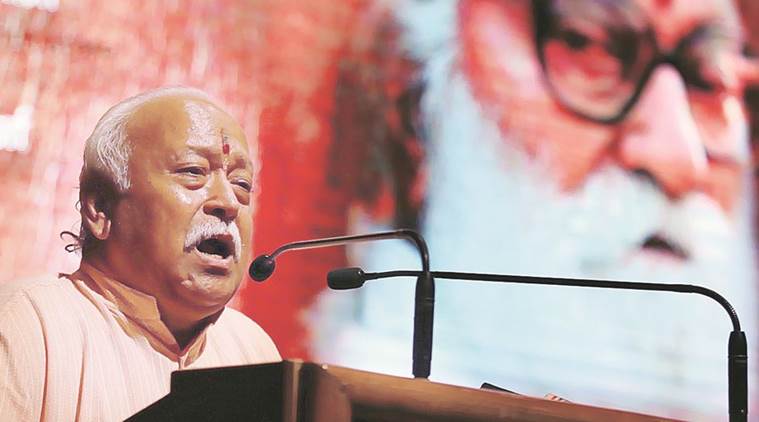 Mohan Bhagwat. (Express Photo by Prem Nath Pandey)
Mohan Bhagwat. (Express Photo by Prem Nath Pandey)
It is reported that about 700-odd academics, including 50 vice chancellors, as a show of their upright commitment to education and the nation, recently attended a workshop at Delhi University organised by RSS affiliates. The purpose of the workshop apparently was to reflect on the “absence of Indian-ness” in the Indian education system, and the creation of autonomous “Indic” thinking. Perhaps this move for the indigenisation of education should be welcomed. For, if we were interested in genuine indigenisation, the following would happen.
First, we would restore fully autonomy to higher education. The king’s arms have no place inside the gurukul. Sovereign power cannot lord over institutions of learning; political intimidation cannot define the contours of what is thought or what is spoken. What place does flag-waving have in a place of learning? This would apply to all institutions. This indigenisation would be altogether worthy.
Second, we would get rid of destructive nationalism in learning. Come to think of it, nationalism is a very un-Indic ideology. For, a culture that supposedly is about the dissolving boundaries of the ego and the self, it makes no sense to replace the ego and the self with the collective narcissism of a larger self. Sure, for political and civic purposes, we need some form of solidarity. But the ahamkara of nationalism, its arrogant absorption of individuality and plurality, its limiting of our intellectual horizons to the nation, is surely a diminution of our indigenous aspirations.
Third, we would finally confront the deep-seated resentment that has haunted the “Bharatiya eco system” of education. This resentment has two sources: How did India manage to reconcile the most radical intellectualism with one of the vilest systems of social hierarchy known to mankind? Yes, these hierarchies were fluid, they were often challenged, but our capacity to oppress people under the tyranny of compulsory identities, to police the boundaries between groups, made it very difficult for intellectual radicalism and openness to make a dent on an oppressive social necessity.
The most magnificent metaphysical tolerance co-existed with social intolerance, the demands of The Soul often mutilated the claims of individuality. For a culture, poetry, the adikavya of Ramayana, was born in a reaction against cruelty, the failure to put avoiding cruelty first when it comes to social relations, is surely a mystery a Bharatiya education would solve.

The second source is this. Colonialism subjugated and delegitimised many forms of knowledge; and some Leftists, driven by ideology more than scholarship, have abetted these mistakes. But this is only a small part of the story as Hazari Prasad Dwivedi always pointed out. The truth was, we were hollowing ourselves out from within; we began to wallow in endlessly rehearsing our own truisms. Just to take one example: There is unbridled resentment in Hindutva circles that the current hierarchies of knowledge privilege the Oxfords and the Harvards. Some scepticism about them would be healthy. But the resentment betrays something deeper. They fail to ask: What prevented the emergence of worthy rivals and alternatives in India, particularly after the 19th century?
The answer is in plain sight. Many European and American universities were religious institutions that transformed into the producers of modern knowledge. Imagine a counterfactual. Imagine if the wealthiest of our religious endowments, from the Sringeri Math to the Tirupati Trust, had over the last two centuries transformed themselves into such hybrid centres of openness and excellence: Where traditional learning was not limited to reproducing the same truisms over and over again, where outsiders were welcome, where modern currents of knowledge woke them out of their socially conservative, dogmatic slumber. Perhaps the history of Indian knowledge production would have been different. God knows, they have enough wealth to do it.
The point is not what the British or the Left did to us; it is what we did to ourselves. In short, indigenisation would frontally help us confront the two deep insecurities that lead to such a resentful nationalism: Guilt at our own social cruelty and failure to confront our own intellectual ossification. There is fleeting recognition of this, when it comes to caste. But nationalism has provided the perfect alibi for finding an external scapegoat. Genuine indigenisation will require liberation from the clap trap of resentment of others. After all, nothing displays the fact that you are possessed by external powers in your very being, more than when you keep blaming outsiders, keep contriving new enemies.
Indigenisation would require confronting the self as much as confronting the other. The insidious claim in the call to indigenisation is this: What counts as Indian? Who gets to set these terms? What about western ideas? What about Islam? Will we recognise, as Aurobindo did, “However much we may deplore some of the characteristics of that intervening period which were dominated by the western standpoint or move away from that standpoint back to our own characteristic way of seeing existence, we cannot get rid of a certain element of inevitable change it has produced upon us, any more than a man can go back in life to what he was some years ago?” Will we recognise as Aurobindo did, that Islam nourished India and was nourished by it? Or will the choice of indigenous be determined by Golwalkar who said non-Hindu peoples must “stay in the country wholly subordinated to the Hindu nation”? A genuine indigenisation would require embracing all of India; not parts of it. So, bring on the indigenisation that embraces all, the Western and the Islamic, the Aghoris and the Tantriks, the Marxists and the Liberals, as Indian.
Bring on the indigenisation, for it might have several collateral benefits. At least, we will stop seeking validation of Rama by the methodologies of alien knowledge like positivist history and archaeology. Surely, Rama’s reality is different. Let the historians have their squabbles. Surely, it is not wise to rest the identity of India on what stone the next dig throws up. Bring on indigenisation: A deep exposure to Indian culture might actually cure the custodians of Indian culture of prudishness, machismo and homophobia. Any exposure to a classical culture will hopefully cure nationalists of a boorish anti-intellectualism, a resentment against, ideas. So bring on “Indic thinking.” After all, if there is an axis to “Indic thinking”, it centres on the mystery of consciousness: How does the mind get hold of its own operations?
Indic thinking will require self-awareness. What we are not sure of is whether the current custodians of nationalism in education can handle its truth.
EXPRESS OPINION
More Explained
May 09: Latest News
- 01
- 02
- 03
- 04
- 05


